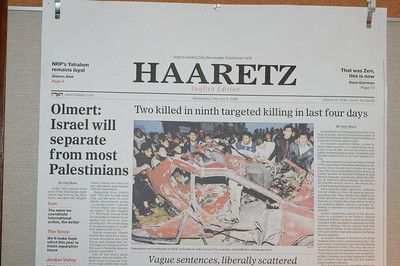Few who follow the conflict between Israel and the Palestinians realise how much the English edition of Haaretz, an Israeli newspaper, frames the discussion. It is a peculiar tale.
For a start Haaretz is not that widely read in Israel itself. According to research reported in the newspaper (paywall) it is way behind Israel Hayom (which is free) and Yedioth Ahronoth (which is also sometimes free).
Nor is Haaretz the only Israeli newspaper with an English edition. The Jerusalem Post claims to be Israel’s most widely read English news website while the Times of Israel is also well-known. In addition, the two most popular Israeli newspapers mentioned above include English language news on their websites.
So what explains the outsized influence of Haaretz?
The answer lies in its role as a bridge between a disaffected section of the Israeli elite and the increasingly “woke” critics of Israel abroad (I dislike the term “woke” but I am struggling to find a better alternative).
The Israeli “left” is to an increasing extend alienated from the Israeli public and the notion of an Israeli state in particular. It feels more comfortable with its elite peers in Europe and North America than with the average Israeli.
Back in the 1990s this trend was often referred to as post-Zionism. Today the label is hardly used but the sense of hostility to Israel as a nation state has intensified.
There are many parallels with elite publications in other countries such as the Guardian in Britain, the New York Times in America and Der Spiegel in Germany. They all tend to see themselves as critics of a traditional establishment but in their own ways are representatives of a refashioned elite. All of them share a sense of cosmopolitanism with disdain for the public in the countries which they come from.
In the Israeli case there is a big demand abroad for criticisms of Israel. From this perspective Haaretz provides the ideal channel as it is generally well informed and it is written in English. It is also all too often an easy way to pick up on flaws in Israeli society without thinking about the context more broadly.
The problem with Haaretz is that it tends to be heavily one-sided. While its criticisms of Israel are sometimes valid it is often breathtakingly naïve when it comes to international comparisons. For example, it will uphold the EU or America under President Biden as positive influences without appreciating their own flaws.
It also criticises Israel apparently without realising that similar and sometimes worse things are happening elsewhere. Of course that does not excuse all of Israel’s actions but it tends not to be held to the same standard as other nations.
Star columnist Gideon Levy, for example, is at the forefront of labelling Israel an “apartheid state”. But, like almost everyone who uses that label nowadays, he seems unaware or uninterested in the specific features of the apartheid era in South Africa. Nor does he seem conscious of the fact that the “apartheid” label has become a means to judge Israel by different standards to other nations.
Those who want to follow developments in Israel should read Haaretz by all means. But they should not lose sight of the one-sidedness of the narrative it pursues.
· PS. A top tip for those who want to spot a non-Israeli television or radio reporter pretending to be a fluent Hebrew speaker. Often they quote Haaretzby name since the Hebrew title of the newspaper could suggest to an overseas audience that they speak the language. But, as anyone with a modicum of Hebrew knows, there should be a short pause between “Ha” (meaning “the”) and “Aretz” (meaning “land”). Yet this tell-tale gap is generally missing when used by foreign correspondents in Israel.

